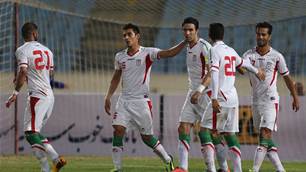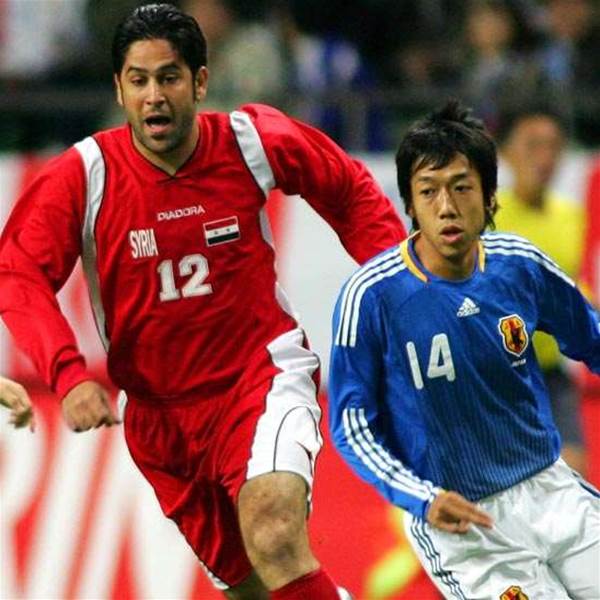POWERHOUSES Japan and Saudi Arabia should progress in a group containing minnows Syria and Jordan. However, if either of the unfancied west Asian nations manage to snag a win against the big guns of the group, it will blow qualification wide open.
Saudi Arabia
A little over a year ago, Saudi Arabian football was at an all-time low.
Looking to qualify for their fifth World Cup finals in a row, the Saudis lost a seemingly straightforward AFC playoff against Bahrain to conclude a downward spiral which included three head coaching changes and some abject performances during the final round of World Cup qualifying.
The national team was in disarray and first step in restoring pride showed unusual restraint on the part of the Saudi FA. Going against a trend of being trigger happy with under performing coaches - they've had 12
in 16 years - Portuguese Jose Peseiro was retained despite the bad run of results.
With a place in the 2011 Asian Cup assured due to their runners-up finish in 2007, the Saudis had to make do with a series of friendlies to fine tune the squad and Peseiro's first task was to settle on a core of players to call upon after much chopping and changing under previous coaches.
One of his first decisions coaching decisions was to drop influential players Mohammmed Al-Shalhoub and Mohammed Noor, the latter widely considered one of Saudi Arabia's best-ever players. The 32 year-old Noor had been enjoying a renaissance at Al Ittihad over recent years, but was seen as surplus to team requirements moving forward. He quickly announced his retirement by saying: "It's obvious that the coach doesn't think about football when he assembles his squad. The decision to leave me out of the team is a political one."
In Noor's absence, the responsibility for the team's success on the pitch falls to possibly it's biggest enigma: Yasser Al Qahtani. A proven goalscorer for both club and country - scoring 59 goals in 94 international appearances - the 28 year-old went off the boil during the ill-fated World Cup qualifying campaign. However, this season he's regained his form, helping club side Al Hilal to the ACL semi-finals. Just which player will turn up for the Green Falcons in January will go a long way to determining how far the Saudis will progress.
The team is strongest up front, with forward Mohanned Aseeri in particularly good form during a 4-0 rout of Uzbekistan. Keep an eye on 21 year-old striker Naif Hazazi, who stepped into the void Al Qahtani vacated during World Cup qualifying. A precocious young talent, the Al Ittihad frontman has averaged a goal every second game since bursting onto the international scene in November 2008 and could be a key man in Peseiro's side.
The Saudis won't be lacking on confidence going into this tournament, after narrowly losing to Spain 3-2 in a pre-World Cup clash and then beating Togo, Gabon and Uzbekistan in subsequent warm-ups.
Star Man
At just 28 years of age, the Al Hilal striker Yasser Al Qahtani is the star of Saudi football at the moment. With a ratio of more than a goal every two games for the Green Falcons and co-winner of the Golden Boot in the 2007 Asian Cup, Al Qahtani has bounced back from a poor showing in 2010 World Cup qualifying to find his cutting edge again.
The Coach
Jose Peseiro - Former Real Madrid assistant Peseiro is the latest on the Saudi coaching hotseat, one which has seen three coaches during 2010 World Cup qualifying alone. Lucky to keep his job after failing to qualify for South Africa, the Portuguese coach will be looking to steer the 'Sons of the Desert' to their first Asian Cup success since 1996 with a mix of young talent and veteran leadership. He will need to avoid fulfilling his reputation for losing his dressing rooms and the players' respect though.
FourFourTwo predicts...
In reality, Syria and Jordan are just making up the numbers in the group, so expect to see the 'Sons of the Desert' battle it out with Japan - in a repeat of the 2000 final - for first place in Group B.
Japan
While Australia may possess the number one ranking in Asia, Japan are the true behemoths of the continent after four successive World Cup finals appearances.
The Samurai Blue have also won three of the last five Asian Cups and considering their performances in the recent World Cup in South Africa, plus their overall experience in taking on various Asian nations, they will touch down in Qatar as favourites ahead of the Socceroos.
Despite a poor set of World Cup 2010 lead-in results, where they were convincingly beaten by Serbia, Korea Republic and England, a totally different side turned up in South Africa to beat Cameroon, Denmark and be narrowly edged out by eventual finalists Netherlands during the group stages.
A defeat on penalties to Paraguay ended their South Africa foray after a goalless stalemate where they blocked out an attacking South American team for 120 minutes. In qualification for the 2011 Asian Cup they topped their group with five wins out of six, smashing 17 goals in the process.
What we learned from South Africa is that Japan are a well organised side, with a few genuine sparks of flair and brilliance that will win them games.
That stability at the back comes from centre-back pairing of Tatsuya Tanaka and Yuji Nakazawa, where the latter has some 110 caps to his name. That aforementioned dazzling flair isn't in short supply either with World Cup star Keisuke Honda, midfielder Yasuhito Endo, Bundesliga right winger and national team captain Makoto Hasebe, plus strikers Shinji Okazaki and Yoshito Okubo.
Japan have a good spread of domestic based players from the strong J.League alongside European-based stars like Honda, Hasebe, right-wing back Atsuto Uchida and midfielder Shinji Kagawa who both play in Germany, plus Yuki Abe who signed for English Championship side Leicester in August.
The team is technically superb, pose a massive threat from their wing-backs and are so deadly from set-pieces that conceding fouls around the penalty box should be avoided at all costs, as they highlighted
in South Africa.
The biggest change post-South Africa was the exit of coach Takeshi Okada, who shot to cult status in South Africa with his stony-face on the sideline seemingly oblivious to the drama on the field. However, in came Italian Alberto Zaccheroni to continue his good work.
Zaccheroni, who spent his first two Japan games in the stands due to visa problems, has made an unbeaten start which has seen Samurai Blue draw with Korea Republic, and beat three South American sides, firstly getting revenge over Paraguay, then toppling Guatemala followed by an historic victory over Argentina - the first time Japan had beaten a top 10 ranked side since 2004.
Star Man
It is not just for the purposes of a pun that we state Keisuke Honda has a great engine on him. He can score, create and play in a variety of positions. His two goals in South Africa proved his star quality.
The Coach
Alberto Zaccheroni - The 57 year-old Italian may be short on Asian experience, but managing 13 different teams in Italy over the past 27 years should hold him in good stead. Those clubs have included the likes of Juventus most recently, Torino, Inter, Lazio plus AC Milan where he won a scudetto in 1999. His ability to transfer that Italian style, where he is famous for playing a unique take on 3-4-3, and experience into the Asian arena will be the next test for "Zac" though.
FourFourTwo predicts...
As the region's best team, anything less than the final will be a disappointment, so expect to see Japan in the last game of the tournament.
Continues on next page...
Jordan
If the last year is anything to go by, Jordanians are in for one hell of a ride when their first Asian Cup game against Japan kicks-off on January 9.
12 months ago Jordan were rooted to the bottom of their Asian Cup qualifying group, having drawn with Thailand and lost to Singapore and Iran in their first three games. Portuguese coach Nelo Vingada was promptly replaced by Iraqi Adnan Hamad but all hope seemed to be lost as they faced top of the table Iran in a do-or-die clash at the King Abdullah International Stadium.
If a nation's footballing destiny can be changed by one moment, then Jordan will look back at Amer Deeb's 78th minute winner in that game as the turning point for their team. Not only did it secure a valuable three points, but it began the West Asian nation's ascent of Group E and a final day 2-1 victory over Singapore - coupled with a 90th minute winner by Iran which ended Thailand's qualification
hopes - saw 'Nashama' become the Asian Cup's most unlikely qualifiers.
Buoyed by only their second qualification for the tournament, Jordan continued their rich vein of form by crushing reigning Asian champions Iraq 4-1 and seeing off fellow qualifiers Bahrain 2-1.
However disappointment was to follow in the WAFF (West Asian Football Federation) Championships in September, where despite hosting the tournament, they could only manage two draws and crashed out in the group stage. Letting a two goal lead to Kuwait slip with half an hour to play in the second match proves coach Hamad still has much work to do.
As results against the Asian big guns have proven, Jordan certainly have the quality to mix it with the larger footballing nations. Striker Hassan Abdel-Fattah has shone for his country in recent months, helping himself to a brace in the ill-fated WAFF draw to Kuwait and developing a good relationship with fellow striker Odai Al-Saify.
20 year-old Deeb is another player coming to the fore in the Jordanian side, as his winning goal against Iran proved. The Al-Wahdat midfielder's strength is getting down the flanks and his ability to attack from deep-lying positions will be crucial as Jordan will undoubtedly be setting themselves up as a counter-attacking side, relying on their speed as a unit to get forward.
Defensively they have the personnel to play this way, led by keeper Amer Shafi, who played out of his skin in the 2004 finals, conceding only one goal from open play in four matches.
Star Man
Goalkeeper Amer Shafi was the hero of his country's 2004 Asian Cup run, keeping three clean sheets in the group stages before bowing out to eventual champions Japan in a penalty shootout. The 28 year-old is considered the best keeper in the Jordanian league and will need to be on top form to keep the likes of Saudi Arabia's Al-Qahtani and Japan's Honda off the scoresheet.
The Coach
Adnan Hamad - A former Iraqi national team striker, sacked by his home nation after failing to get them to the final stages of the 2010 World Cup qualification, Hamad then sparked Jordan's amazing qualification campaign that saw them transform from rock bottom easy-beats to last day qualifiers. The 49 year-old was the AFC Coach of the Year in 2004 after leading Iraq to the Olympic semis and will need to be at his inspirational best to guide 'Nashama' out of the group.
FourFourTwo predicts...
Jordan are the minnows of the group and it will take a herculean effort to see them progress from Group B. But if there's one thing the Jordanians have demonstrated over the last year, it's a never-say-die attitude. Opponents be warned: take Jordan lightly at your peril.
Jordan
Syria are one of the most intriguing sides to take the field in Qatar.
After a 15 year Asian Cup abscence, the West Asians were the only country to emerge from qualifcation undefeated, and although their group included the distinctly average Lebanon and Vietnam, their achievement shouldn't be taken lightly.
Taking four points from China over two legs is no mean feat in the heat of qualifying, and a 4-0 away dismantling of Lebanon to finish the campaign was just as impressive.
However, after the qualification success, the Syrian FA made the bold move of parting company with coach Fajer Ebrahim after some average performances. With a surprising 2-1 defeat at the hands of Yemen, the final nail in the coffin was a bottom of table finish at the WAFF Championships and leading the national team in Qatar will now be 64 year-old Serb Ratomir Djukovic.
Whether or not Djukovic shares Ebrahim's opinion of where Syria should finish - "I have set a last four target for the team but I believe we have the ability to go beyond that stage," said the former coach in January - what is clear is that in signing the Serb to just a three-and-a-half month contract, much of the good work accomplished by Ebrahim has now been compromised for a short-term fix for the coming tournament and no further.
What Dujkovic does enjoy is a real core of talented and experienced players to call upon. Top of that list is striker Firas Al Khatib, who has a fantastic scoring record for both club and country. With more than 150 goals in eight years in Kuwait's Premier League, Syria's captain is an inspirational, 'lead by example' figure to his teammates, much in the same way Steven Gerrard is at Liverpool.
Supporting Al Khatib is his Al-Qadissiyah teammate Jehad Al-Hussain, an attacking midfielder who likes to get forward at every opportunity and is not afraid to put himself about despite being only five foot seven.
Midfielder Abdul Razak Housain is another young star in a team with an average age of just 24, and if Djukovic heeds any advice from the former coach, it might be to continue to give youth a chance.
With time of the essence, it would seem likely Djukovic will not tinker too much with Syria's formation or tactics. In charge of Ghana at the 2006 World Cup, the Serb struck a balance between structure and self-expression that should translate well to the players in the Syrian squad. Along with defensive vigilance, allowing talisman Al Khatib the freedom to play to his strengths in the final third will be key to Syria's success.
Just how much success Syria will have is another matter.
Star Man
Described by former coach Fajer Ebrahim as Syria's "best player and a great leader", striker Firas Al Khatib made his name at Kuwaiti side Al-Arabi where he scored an impressive 133 goals in 196 games. Now with Al-Qadissiyah, the 27 year-old will be heading to Qatar at the peak of his powers and eager to add to his 27 goal national team haul.
The Coach
Ratomir Dujkovic - After a series of bad results saw Fajer Ebrahim given his marching orders, Syria have brought in the former Chinese Olympic team coach Dujkovic on a short-term contract for the Asian Cup. Best known for leading Ghana to the 2006 World Cup, he has experience in several roles including South American sides and various U23 teams. However, has the 64 year-old Serb been given enough time to put his stamp on the team?
FourFourTwo predicts...
It is very hard to say that Syria will get any further than the group stages considering their tough draw. With their first two group games against Saudi Arabia and Japan, by the time it comes to the winnable final fixture against Jordan, their Asian Cup adventure could already be over.
Related Articles

Asian Cup - one year to go

Matildas draw world champs Japan in Asian Cup













